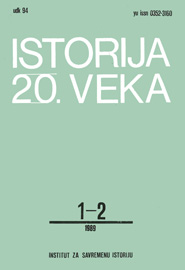SRPSKI KULTURNI KLUB (1937 - 1941)
THE SERBIAN CULTURE CLUB 1937 - 1941
Author(s): Nebojša A. PopovićSubject(s): Media studies, Political history, Recent History (1900 till today), Nationalism Studies, Interwar Period (1920 - 1939), WW II and following years (1940 - 1949)
Published by: Institut za savremenu istoriju, Beograd
Keywords: Kingdom of Yugoslavia; Serbia; Serbian Culture Club; 1937-1941; interwar period; politics; media; nationalism;
Summary/Abstract: The formation and the activity of the Serbian Culture Club (SCC) in the period 1937 - 1941, are among the least clarified aspects of the social and political life between the wars in Yugoslavia. The main reason for the neglect to conduct a research on this topic lies certainly in the inaccessibility and scarceness of the sources of information but is probably also due to the „delicate” nature of this subject. The Serbian Culture Club gathered in its ranks the cream of the Serbian intellectual and partly also political, elite. The Club was led by Slobodan Jovanović (Chairman), university professor, Dragiša Vasić, writer and attorney, Vladimir Ćorović, univ. prof., Mihajio Konstantinović, minister and others. The initiative for founding the Club had come from Nikola Stojanović, an attorney from Sarajevo. The SCC was founded in the beginning of 1937, as a strictly centralized organization, in which the highest authority were the Chairman and the Supervisory Board, while the Club Assembly had considerably diminished decision making rights. The „Program" of the Club placed cultural objectives before all others and put emphasis on declaring political issues to be irrelevant to the Club's activity. The gap between the Club's proclaimed goals and those which it actually set and attained in practice grew wider with time. The Club was transformed from a cultural association to an organization which acquired all the attributes of a classic political party. The extremely centralized SCC started a political newspaper („Srpski glas” — „The Serbian Voice"), established local branches (sub-committees) and organized its own „youth” within a special Youth Section. The cultural activity of the Club, which was carried out through various Club sections, lectures, articles, special editions, was based on traditionalistic national products and institutions. The primary conclusion which asserts itself is that the „culture" of the SCC was reduced to being an instrument of the Club's political activity. The SCC appeared following the failure of the January 6th experiment, in the years in witch political life was being liberalized. The national issue, which had until then suffered the greatest suppression, came to the forefront. It was brought up by the Croatian political leaders who demanded that this issue be settled by changing the social structure. In these conditions of a scattered Serbian political front and the breaking up of leading Serbian political parties, while on the other side the Croatian Peasant Party presented a compact national program, the SCC supported the homogenization of Serbian political powers. Aspiring to the position of the supreme interpreter of Serbian national demands, the SCC sublimated in its political ideology the national demands of almost all Serbian political parties. The Club became politically very active in the autumn of 1939, following the Cvetković-Maček Agreement. The SCC was against the creation of the Region of Croatia as a „corpus separatum ” within the Yugoslav State. The Club pointed out that the position of Serbia after the Agreement was extremely undefined. The pro-British SCC expressed concern over the increasing surrounding of Yugoslavia by Germany and Italy, on which the domestic separatist powers relied. The SCC declared itself clearly as being in favor of protecting the territorial integrity of the Kingdom of Yugoslavia. The activity of the SCC met with the reaction of numerous political and cultural entities in the country. The harshest criticism came from the Croatian side. The Club was accused of supporting the current of Serbian nationalism and to have gathered „Serbian chauvinists” in its ranks. Analysis clearly shows that the political ideology of the SCC contained all the basic traits of nationalism, while it is difficult to find evidence for the chauvinistic dimension.
Journal: Istorija 20. veka
- Issue Year: 1989
- Issue No: 1+2
- Page Range: 109-140
- Page Count: 32
- Language: Serbian

